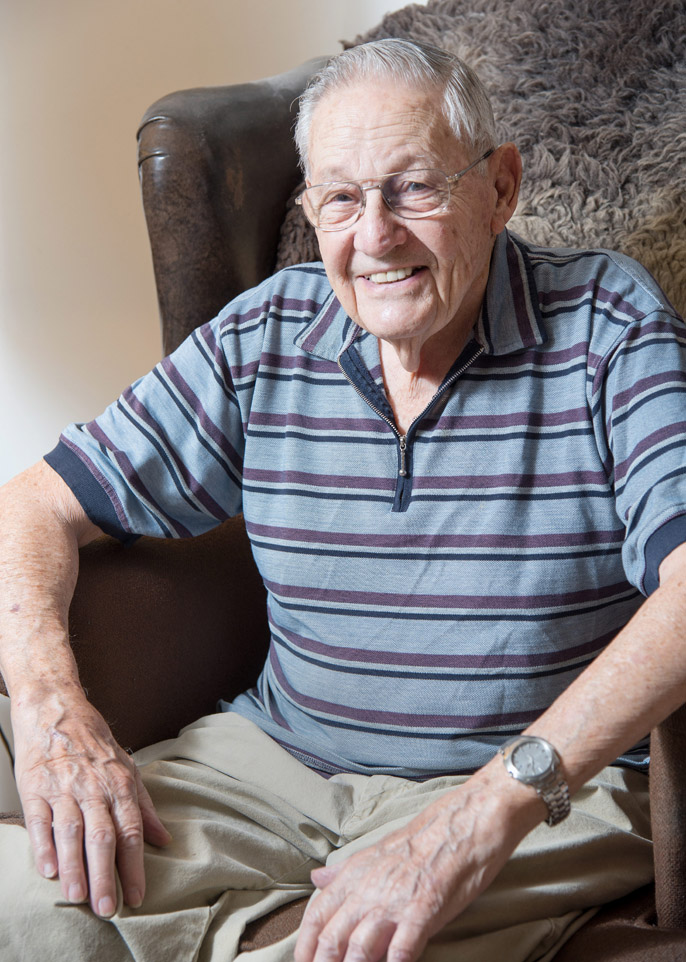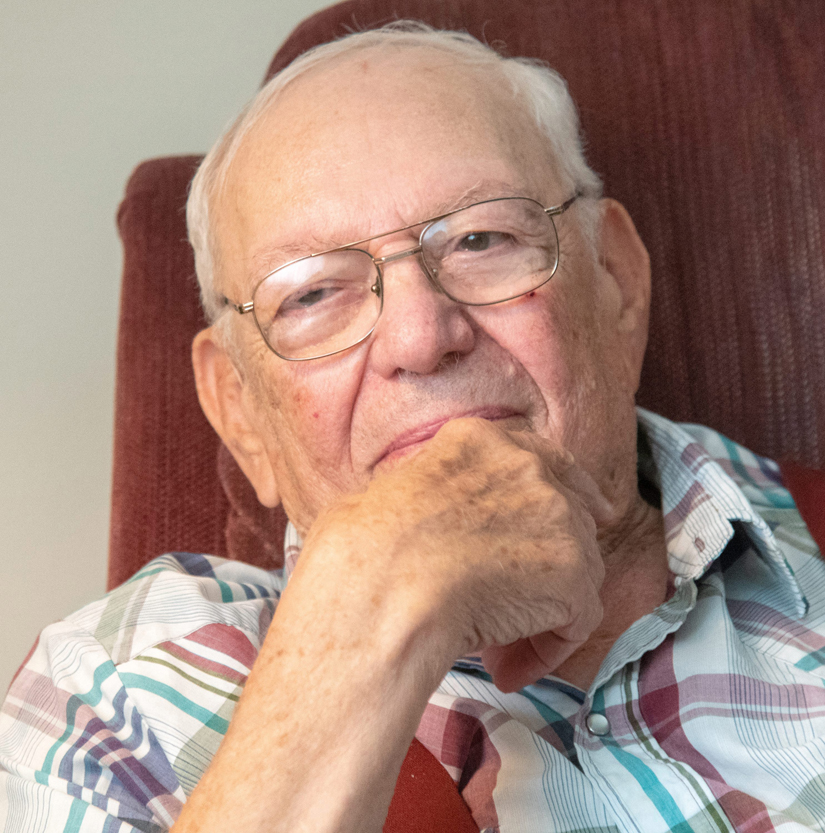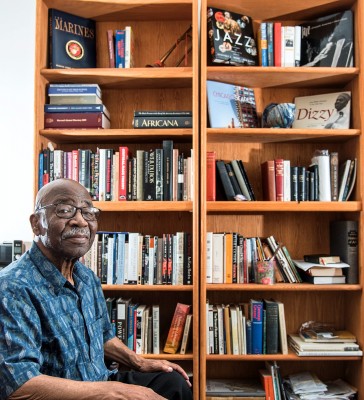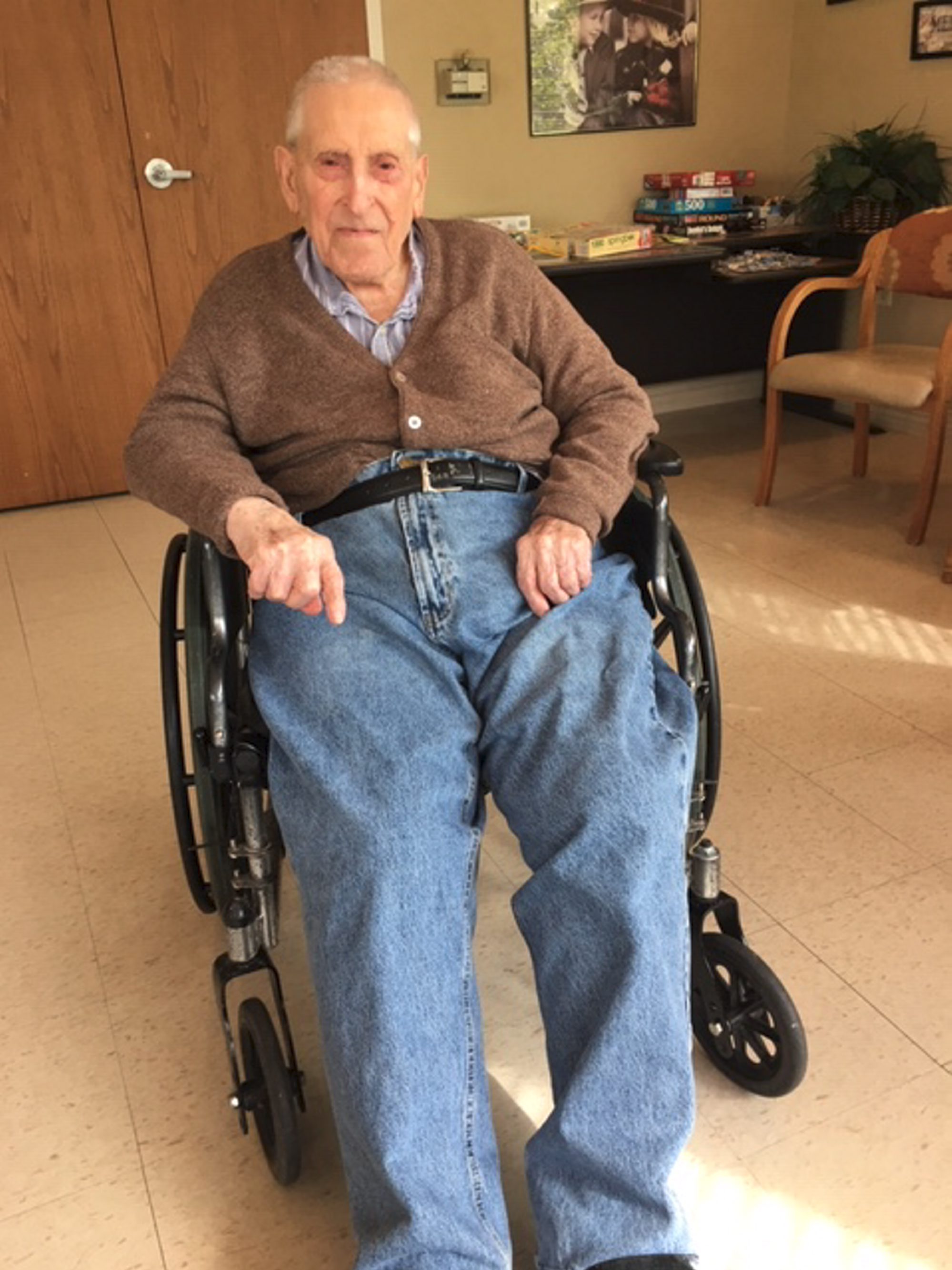Roy Charles
By Paul Wood

Photo By Rick Danzl/The News-Gazette
URBANA — As Marine Roy Charles fought his way across the Pacific, it became clearer and clearer that the tide was turning for the American side.
The Japanese had ignited the war with a surprise attack on Pearl Harbor, then quickly taken Singapore and the Philippines. The Pacific had become their ocean, and there were fears that our West Coast could be attacked.
But by 1944, the Fourth Marine Division was moving ever closer to Japan itself, taking island after island, and Charles was in the thick of it.
He hadn’t intended to join the Marines. Raised in Urbana in a house on Washington Street that still stands, he dreamed of being an aviator.
With a friend, he traveled to Rantoul’s Chanute Field to join the Army Air Forces, but flunked his physical.
“I thought I had a cold, but it was pneumonia,” says Charles, now 93.
A bunch of friends then traveled to Danville to enlist in the Marines, which was taking only a select few at the time.
Before he could complete enlistment, he was sent to Peoria to be drafted. But the draft board found his Marine paperwork and put him in the corps.
By 1944, the U.S. had retaken lost territory and was advancing on the Marshall Islands, which had been occupied by the Japanese for 30 years and were heavily fortified.
According to the Fourth Division’s official history, the operation “would be the most important of the Pacific War to date; it would constitute the first offensive strike against the enemy to secure a base for operations.”
In February, the Fourth Marine Division battled on the islands of Roi-Namur, which were joined by a causeway, Charles recalls.
Ships shelled the islands to soften them up for invasion.
At Roi-Namur, they attacked Roi, the western half, and took the airfield. Namur proved to be tougher for the troops, many of whom were seeing their first battle, Charles said.
But it was tougher still for the Japanese, who were unaccustomed to defeat and were shamed by it.
Charles’ most vivid memory of the battle was the sight of a long trench full of dead Japanese soldiers.
They had string tied to their toes and to their rifles, and they shot themselves in the head, he recalls.
“The whole row shot themselves,” he says.
Charles’ unit was next sent to the Mariana Islands to cut Japanese lines of communication, when, beginning June 15, 1944, they fought in the victory of Saipan.
“It was tougher than Roi-Namur,” Charles recalls.
Tinian, only 5 miles away, was next. This island became an important air base; from it later launched the bombers that hit Hiroshima and Nagasaki.
Charles recalls the landing at Tinian as particularly rough logistically. Tanks were waterproofed as they dropped into a 5-foot-deep surf.
A Japanese counter-attack destroyed most of their own best troops, according to the divisional history.
The aftermath of the battle was also horrific for the Marine. Fathers and mothers threw children off cliffs, Charles recalls, then jumped to their own deaths.
“We had trucks with loudspeakers, begging them not to jump,” he recalls.
Iwo Jima was his last and toughest battle. Even walking on the beach was a difficult task as troops sank in the volcanic sand. The ground was so hot, it was difficult to sleep on, he recalls. The airport was booby-trapped with heavy bombs.
Despite the string of American victories, Charles said that invading Japan would have been the grimmest task of all.
“They had brainwashed the Japanese people to fight to the death,” Charles says.
Like many veterans of the war, he feels that dropping the two atomic bombs was necessary to prevent invading the islands.
“Everybody complains about us dropping the bombs. I’m glad we did. They would have fought back to the death. It would have lasted a long time,” he says.
After the war, Charles tried a couple of jobs before he found his permanent one with the University of Illinois, making precision tools for biologists.
In 1950, he married Joanne, who joined him for the interview. They have three children and eight grandchildren.
Do you know a veteran who could share a story about military service? Contact staff writer Paul Wood at pwood@news-gazette.com.
Read more stories from local veterans:
 Howard Ross
URBANA — Howard Ross earned the Purple Heart when Japanese troops zeroed in on his position in the last few months of Wo …
Howard Ross
URBANA — Howard Ross earned the Purple Heart when Japanese troops zeroed in on his position in the last few months of Wo …
 Joseph Smith
URBANA — Talk about being caught between a rock and a hard place. Marine Cpl. Joseph Smith was sleeping in a depot with …
Joseph Smith
URBANA — Talk about being caught between a rock and a hard place. Marine Cpl. Joseph Smith was sleeping in a depot with …
 James Paul Lafary
PAXTON — James Paul Lafary stayed on the ground, but saved many bomb crews from crashing after they came under attack. T …
James Paul Lafary
PAXTON — James Paul Lafary stayed on the ground, but saved many bomb crews from crashing after they came under attack. T …